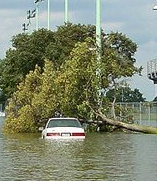Isaac began its long, slow trek inland on Wednesday, hours after it made landfall over southeastern Louisiana.
Driving rains and heavy winds pelted the Gulf Coast, including New Orleans, on the seventh anniversary of Hurricane Katrina. Isaac is the first hurricane to hit the Gulf Coast since Ike in 2008.
NOW WHAT?
While there have been some scattered reports of flooding and people being stranded, the full picture of how devastating Isaac really was isn't likely to emerge anytime soon. Rain and wind are still slamming the coast, and it could take days for power to be restored and floodwaters to recede.
Whatever is left of Isaac is also expected to move into the nation's drought-stricken heartland, so the damage could be far from done.
Craig Fugate, administrator of the Federal Emergency Management Agency, underscored that point on Wednesday morning: "It's going to be frustrating," he said. "The response will start when conditions allow, not when the sun shines."
WHAT DOES MAKE LANDFALL MEAN?
A hurricane is considered to have made landfall when the center, or eye, intersects with a coastline.
The strongest winds are often not in the center of a hurricane. They are usually on the storm's outer bands that come ashore before and after the eye. Sometimes an uneasy calm actually is felt when the eye passes over, but it is often followed by more strong winds and rain.
DAMAGE
While people across the coast boarded up their homes to prepare for damaging winds, the even bigger fear is potential flooding.
The greatest concern is an expected storm surge of between 6 and 12 feet off the Louisiana and Mississippi coasts, 4 to 8 feet along the Alabama coast and 2 to 4 feet on the Florida Panhandle. Storm surge is when hurricane winds raise sea levels off the coast, causing flooding on land.
In the Big Easy, residents hunkered down behind levees fortified after Katrina. Farther south, water was pushed over a rural levee and flooded some homes. Beachfront roads were under water, and more than a half-million people had lost power in Louisiana.
Isaac already left a trail of destruction in the Caribbean, most of it caused by flooding that killed 24 people.
REPUBLICAN NATIONAL CONVENTION
Isaac veered well west of the Republican National Convention site in Tampa, but it was soggy over the weekend in the bayside city. The GOP pushed back the start of speeches a day to Tuesday and protesters' ranks have been small, in part because of the soaking brought on by Isaac and in part because of the huge police presence in the city.
The storm has also altered some Republican governors' plans to attend. Florida Gov. Rick Scott canceled a speaking engagement, and Louisiana Gov. Bobby Jindal and Alabama Gov. Robert Bentley canceled their trips to Tampa.
Copyright Associated Press. All rights reserved. This material may not be published, broadcast, rewritten, or redistributed.



Comments
Use the comment form below to begin a discussion about this content.